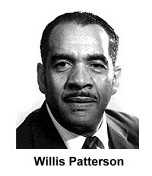
ArticlesWillis Patterson's New Music Books
In 2002 The Second Anthology of Art Songs by Black American Composers was published. It has forty-eight songs by fifteen African-American composers. As a listener, I am excited that all these new songs will enrich the recitals we attend as the book becomes more widely used. The Anthology is spiral bound for ease of use at the piano and music stand. At $75 it is not inexpensive but it has two CDs, with all selections being sung, bound into the back of the book. This lets the listener become familiar with the shape of the songs. Another reason for owning the book is to have the texts which are not always provided when English language songs are on recital programs. Having heard the works of Dr. Hailstork live (and often by the singer for whom they were written), leaves local listeners at a great advantage over any recording but then there are all the other songs that are new. There are thirteen songs by our prolifically gifted local composer Adolphus Hailstork. In the first volume there are only two songs by Hailstork: A Charm at Parting (text by Mary Phelps) and I Loved You (text by Alexander Pushkin). In the second volume you will find Slave Song (text by Frederick Douglas); Songs of Love and Justice (text by Martin Luther King, Jr.): Justice, Difficulties, Decisions and Love; Four Love Songs (text by Paul Lawrence Dunbar): My Heart to Thy Heart, Invitation to Love, Longing and Goodnight; If We Must Die (text by Claude McKay) and the cycle Three Simple Songs: Not in Vain (Emily Dickinson), The Daffodils (Williams Wordsworth) and Christmas Everywhere (Phillips Brooks). Individual songs may be found on anthology CDs but we look forward to the day when we'll have a CD devoted exclusively to the songs by Dr. Hailstork. Another example of how this second volume enriches and expands the repertory is the work of H. Leslie Adams. In the first volume there is only one song by Adams, For You There is no Song. In the second volume there are four: Prayer (text by Langston Hughes) and three with text by Joette McDonald: Flying, Midas, Poor Midas and Christ at a Wedding. In 2000 the first CD devoted to a single African-American composer of art songs, Love Rejoices, Songs of H. Leslie Adams, was issued by Albany Records (TROY 428). Darryl Taylor, tenor, is the singer. His understanding of these songs and his ability to project their meaning is superb. Technically the CD is flawless, offering 75 minutes of Adams' twenty-two songs. In 1997 Mr. Taylor created the African-American Art Song Alliance on the world-wide web. To order the Second Anthology of Art Songs by Black American Composers, visit http://www.videmus.org/catalog/index.php?fwa=scores or phone 1-252-353-1636. To order by mail: P.O.Box 2033, Greenville, NC 27836. $75 plus $5 shipping. Dr. Patterson's other new book, The New Negro Spiritual has one CD and costs $40 and offers a selection of twenty-three songs by thirteen composers. This book will enrich greatly what we will hear sung at recitals and on CDs. In his preface to both anthologies Dr. Patterson directs our attention to the continuing distinction between African-American art song and spirituals. He questions whether or not the distinction is a valid one. There may be a slight aural resemblance to what was sung in places of labor and worship but the very act of preservation which involves written notation, assigned accompaniment and standard harmonization involves a composer/arranger. He then examines the growth of the song form in spirituals and the changes it has undergone in the hands of many composers: changes of text, harmony, rhythm and as a spinoff of this process, gospel songs. Thus spirituals are the true hybrids of American song form. He goes on to site specific songs that are included in his anthology. Two examples will illustrate his point: At the Feet of Jesus by Hall Johnson sets a text by Langston Hughes using the traditional form of a spiritual. Follow Me, composed by R. Nathaniel Dett, who calls it a spiritual, is a through-composed art song. Dr. Patterson gives other examples of just how fuzzy the distinction of art song vs. spiritual has become. He lets the reader decide for himself. He just presents the evidence that the distinction becomes less and less descriptive of what is actually happening. To order The New Negro Spiritual visit http://www.videmus.org/catalog/index.php?fwa=scores or phone 1-252-353-1636. To order by mail: P.O.Box 2033, Greenville, NC 27836. $40 plus $5 shipping.
|
 A point not to be missed is how important Dr. Willis Patterson's
first Anthology of Art Songs by Black American Composers
has been. This collection, published in 1977, contains forty-one
songs by twenty-four African-American composers. It has made available
to a wide audience songs that might otherwise be unknown. Certainly
in Tidewater we are blessed to hear selections from this anthology
regularly.
A point not to be missed is how important Dr. Willis Patterson's
first Anthology of Art Songs by Black American Composers
has been. This collection, published in 1977, contains forty-one
songs by twenty-four African-American composers. It has made available
to a wide audience songs that might otherwise be unknown. Certainly
in Tidewater we are blessed to hear selections from this anthology
regularly.